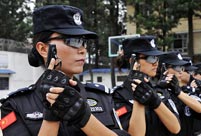 Interpreting the eight issues of the G20 summit
Interpreting the eight issues of the G20 summit
 Photo story: A rural orphan's wish
Photo story: A rural orphan's wish
 President Xi visits four central Asian nations and attend G20, SCO summits
President Xi visits four central Asian nations and attend G20, SCO summits
 Tibetan ethnic costumes presented during tourism festival in NW China
Tibetan ethnic costumes presented during tourism festival in NW China
 Update the China-ASEAN relationship
Update the China-ASEAN relationship
 Fresh students 'forced' to register in university independently
Fresh students 'forced' to register in university independently
 Vintage cars exhibited at auto cultural festival in China's Shanxi
Vintage cars exhibited at auto cultural festival in China's Shanxi
 Reading by the tongue
Reading by the tongue
 Those embarrassing copycat buildings
Those embarrassing copycat buildings
Laurels can be rested on as Olympic champion swimmer Sun Yang has won four gold medals from the Chinese National Games without taking a dip.
Sports are not equal in the country's most premier sporting event as the women's volleyball winner has swept three gold medals while the rugby champion will have to settle for one gold.
The weirdest medal counting system is being used in the 12th Chinese National Games, which awards two golds to the winner of each Olympic gold in London and three golds to the respective winner here of soccer, volleyball and basketball, known as "three big balls" in China.
The losing team in any of "three big balls" finals won't pick up silver medal. They will get two gold medals instead, while the third-placed team has one.
Where will silver and bronze medals go?
The fifth-placed team will be awarded three silvers and the ninth finisher will go home with a bronze.
The Tianjin women's volleyball team, the defending champion, was the early beneficiary of the system as it beat host Liaoning 3-1 on July 20 to sweep three gold medals.
The medal counting system for the Liaoning games, which will officially open on Saturday, was set by the State Administration of Sport in 2010 to encourage "the development of three big ball games and Olympic sports".
Chinese web users are sarcastic about the counting method.
"That's ridiculous," said a poster on Sina Weibo, China's version of Twitter. "It needs a mathematician to count medal tally."
"That's really funny," said another poster. "Silver medalist is not second-place finisher, while bronze medalist might be ninth."
Sun Yang, the winner of two Olympic gold medals in London Olympics who represents southeast China's Zhejiang Province, might wrap up 11 gold medals from the national games.
With four golds under his belt, he is expected to compete in the men's 100m, 200m, 400m and 1,500m freestyle events and three team events.
 Weekly selection of world photos (Aug.19-Aug.24)
Weekly selection of world photos (Aug.19-Aug.24) Army aviation brigade in actual-troop drill
Army aviation brigade in actual-troop drill Top 10 Chinese provinces for the well-heeled
Top 10 Chinese provinces for the well-heeled  Baby born to save his sister - the story of a savior sibling
Baby born to save his sister - the story of a savior sibling Lady of mystery: Female SWAT team in prison disclosed
Lady of mystery: Female SWAT team in prison disclosed  Single mother, baby live in KFC restaurant for months
Single mother, baby live in KFC restaurant for months Fan Bingbing poses for Malaysian magazine Citta Bella
Fan Bingbing poses for Malaysian magazine Citta Bella Zhang Xinyi covers COSMOPOLITAN
Zhang Xinyi covers COSMOPOLITAN A collection of bizarre rooftop buildings around China
A collection of bizarre rooftop buildings around China 100th birthday of 'Little Mermaid'
100th birthday of 'Little Mermaid' China, U.S. conduct joint anti-piracy drill
China, U.S. conduct joint anti-piracy drill  'Abandoned' life in cement boats in Huai River
'Abandoned' life in cement boats in Huai River 2013 Taiwan Int'l Tourism Expo kicks off in Taipei
2013 Taiwan Int'l Tourism Expo kicks off in Taipei Photo story: Take a gap year
Photo story: Take a gap year Nokia's Global Headquarters: visiting a declining empire
Nokia's Global Headquarters: visiting a declining empireDay|Week|Month